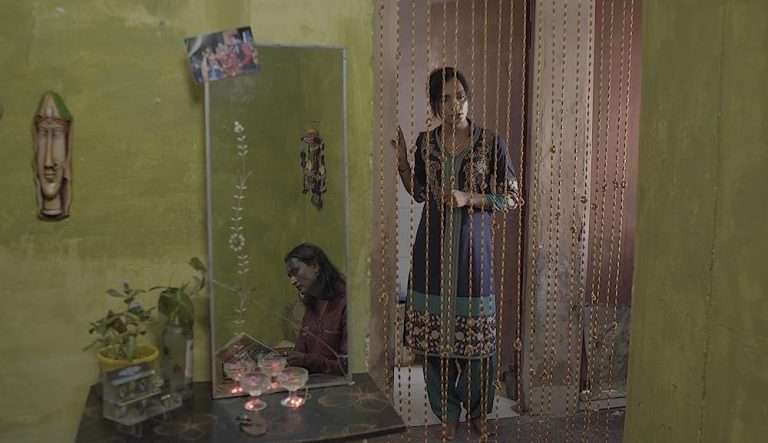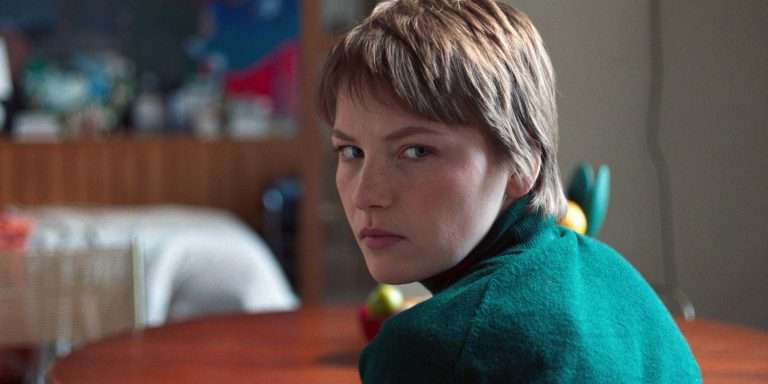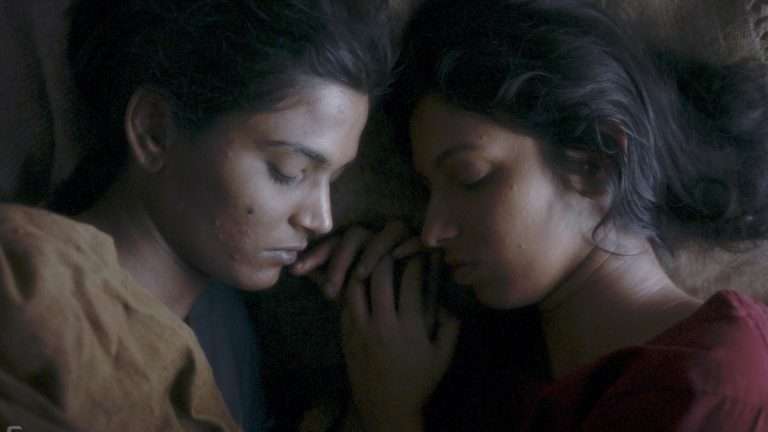Creatura (2023) is a Catalan-language film by Spanish filmmaker and actor Elena Martin Gimeno, which was screened at Cannes Directors’ Fortnight. It boldly explores an adult woman’s sexuality, her emotional hangups (including self-hatred), and the generational wounds she inherits. In Creatura, Elena Martin has delicately visualized feelings that are difficult to articulate. Moreover, the filmmaker herself has offered a phenomenal performance in the central character, Mila, which demands a lot of emotional and physical exposition. At the outset, Creatura seems like a familiar tale of a grown-up woman returning to where she grew up to heal herself and reclaim her lost desires. But it doesn’t narrate a dramatized account of abuse and trauma.
Writer/director Elena instead takes a distinctly intimate approach to focus on minor repressions, unprocessed feelings, and unspoken words, and hence the experiences are understandable, if not relatable. Creatura (creature) sounds like an odd title for this film; the English counterpart is often used in a demeaning context. Yet the Spanish word ‘criatura’ is an endearing or affectionate word to call the children. Mila is one such angelic, perfect girl for her parents, Gerard (Alex Brendemuhl) and Diana (Clara Segura).
Creatura opens with 30-year-old Mila (Elena Martin) moving back to her family home in a coastal town in Catalonia. She moves in with her boyfriend, Marcel (Oriol Pla). On their first night at the house, Mila and Marcel try to have sex. But despite the passion, they don’t seem to be in sync with each other. The resulting conflict reveals that the couple’s sexual relationship has had its troubles in the recent past.
While Marcel shuts himself up, Mila is on the verge of neurosis. The stress manifests in Mila’s body in the form of rashes. The adult Mila’s complex and turbulent relationship with her body and sexuality is naturally tied to her adolescence and childhood. First, the narrative jumps to look at the desires and discomforts of 15-year-old Mila (Claudia Dalmau).
She has a crush on one of the town’s bad boys. She stumbles upon perverted webcam chatrooms with her friend Aina to broaden her sexual experiences. Mila goes out with her new friends to the drink parties. She tries to make out with a bad boy, where her anxiety rears its head. Mila focuses on her body image to make herself an object of desire. Subsequently, she is called a ‘slut’ by her childhood friend. Most importantly, Mila lives in a small town among conservative grown-ups too concerned about their children. At one point, she dates a good guy – her childhood friend – but still, her movements are restricted. Her beloved dad shouts at her, “You’re making me uncomfortable.” It’s devastating to watch teenage Mila repeatedly grappling with feelings of shame.
Later in the narrative, Marcel utters the exact words. It happens when Mila attempts to spice up their sex life by engaging in a simple roleplay. Mila’s sexuality and her propensity to talk about her feelings and enquire about others’ often seem too much to handle for the people around her. Moreover, Marcel has his own set of insecurities, and Mila’s desire to have open communication (according to him) makes him feel like an object of scrutiny.
The strength of Creatura is how Elena Martin ably comprehends and sympathizes with her characters. Mila isn’t shown to have been wronged by her family or her partner. She definitely has the misfortune of going through experiences that impact her perception of her sexuality, body, and relationships.
Marcel, Mila’s dad, and mom carry their own emotional baggage, which shapes their relationship with her. Mila has grown up with a dad who is somewhat physically distant from her. Director Elena Martin sensitively stages an episode from Mila’s childhood (Mila Borras plays 5-year-old Mila). The seemingly simple set of incidents during her childhood somehow inflicts a wound deep within Mila. Her embarrassment when her dad asks her to dance with him is understandable when we get the whole picture of the father-daughter relationship. As an adult, Mila engages in an aching conversation with her dad about why they aren’t physically affectionate with each other – hugging, holding hands, and such.
Once again, she brings up the question of whether he is comfortable with her. The dad, of course, like most men, hasn’t thought about expressing affection through gestures or words. The scene is gracefully cut to 5-year-old Mila as she and her dad are bathing in the sea, perfectly comfortable with each others’ bodies. Director Elena Martin doesn’t forget about the mother’s suffering too, amidst all these minor repressions and everyday conflicts. Mila’s journey of reconciliation and self-discovery comes full circle when she empathizes with her younger self and her parents. The small moment when Mila’s dad hugs her or when the mom freely speaks with her daughter gives ample hope for Mila’s healing.
Creatura is a second feature film for Elena Martin Gimeno, and it’s solidly directed. Water and the lulling sound of the sea are recurrent motifs in the narrative, representing Mila’s journey of rejuvenation and healing. Though the narrative unfolds in picturesque surroundings, the frames are often tight, intimately registering the wide spectrum of emotions. In fact, Mila’s physical suffering almost verges on the body horror territory.
Creatura (112 minutes) might be touted as a story about female sexuality (and sexual development) made with a tender female gaze. However, Elena Martin’s film, in a broader sense, asks us to be more compassionate to ourselves while combating the generational wounds that are passed on to us.




![KIMI [2022] ‘HBO Max’ Review: Cyber Thriller Presents Both Sides of the Technological Boom](https://79468c92.delivery.rocketcdn.me/wp-content/uploads/2022/02/KIMI-2022-768x432.jpg)


